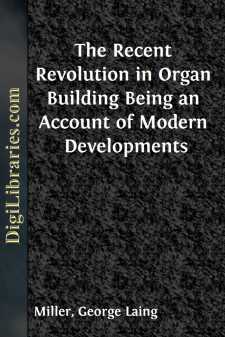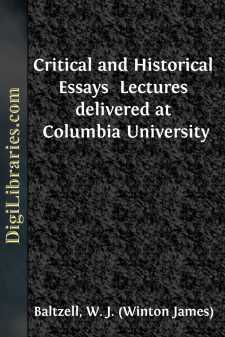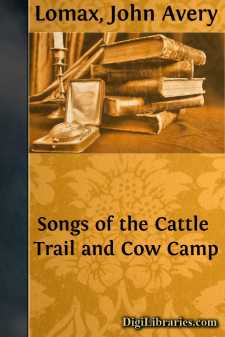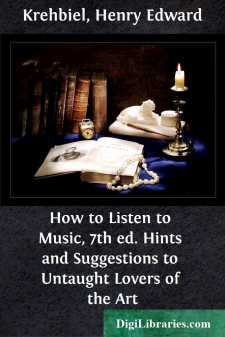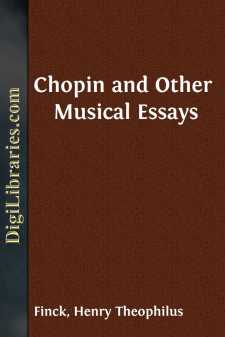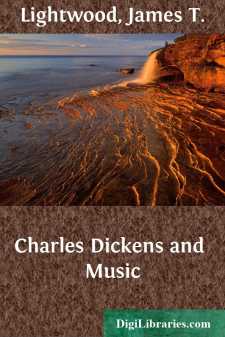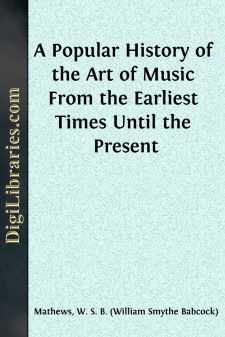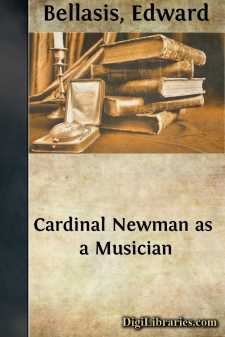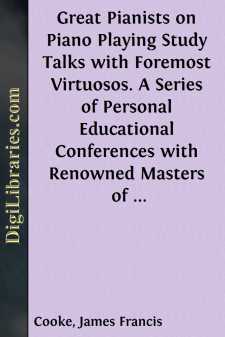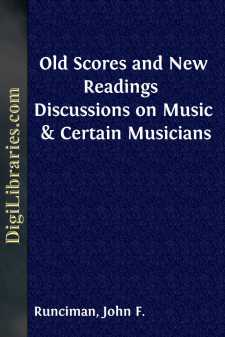Music
Music Books
Sort by:
CHAPTER I. "The Organ breathes its deep-voiced solemn notes,The people join and sing, in pious hymnsAnd psalms devout; harmoniously attun'd,The Choral voices blend; the long-drawn aislesAt every close the ling'ring strains prolong:And now, of varied tubes and reedy pipes,The skilful hand a soften'd stop controuls:In sweetest harmony the dulcet strains steal forth,Now swelling high,...
more...
CRITICAL AND HISTORICAL ESSAYS Darwin's theory that music had its origin “in the sounds made by the half-human progenitors of man during the season of courtship” seems for many reasons to be inadequate and untenable. A much more plausible explanation, it seems to me, is to be found in the theory of Theophrastus, in which the origin of music is attributed to the whole range of human emotion....
more...
by:
John Avery Lomax
COWBOY YARNS The centipede runs across my head, The vinegaroon crawls in my bed, Tarantulas jump and scorpions play, The broncs are grazing far away, The rattlesnake gives his warning cry, And the coyotes sing their lullaby, While I sleep soundly beneath the sky. OUT WHERE THE WEST BEGINSOUT where the handclasp's a little stronger,Out where the smile dwells a little longer,That's where the...
more...
IntroductionThe book's appeal.This book has a purpose, which is as simple as it is plain; and an unpretentious scope. It does not aim to edify either the musical professor or the musical scholar. It comes into the presence of the musical student with all becoming modesty. Its business is with those who love music and present themselves for its gracious ministrations in Concert-Room and Opera...
more...
I CHOPIN THE GREATEST GENIUS OF THE PIANOFORTE Leipsic, the centre of the world's music trade, exports about one hundred thousand dollars' worth of music to America every year. I do not know how much of this sum is to be placed to the account of Chopin, but a leading music dealer in New York told me that he sold three times as many of Chopin's compositions as of any other romantic or...
more...
CHAPTER I The attempts to instil the elements of music into Charles Dickens when he was a small boy do not appear to have been attended with success. Mr. Kitton tells us that he learnt the piano during his school days, but his master gave him up in despair. Mr. Bowden, an old schoolfellow of the novelist's when he was at Wellington House Academy, in Hampstead Road, says that music used to be...
more...
INTRODUCTION. I. HE name "music" contains two ideas, both of them important in our modern use of the term: The general meaning is that of "a pleasing modulation of sounds." In this sense the term is used constantly by poets, novelists and even in conversation—as when we speak of the "music of the forest," the "music of the brook" or the "music of nature." There...
more...
by:
Edward Bellasis
It is a remark of St. Philip Neri's latest biographer that, "Our Saint was profoundly convinced that there is in music and in song a mysterious and a mighty power to stir the heart with high and noble emotion, and an especial fitness to raise it above sense to the love of heavenly things." In like manner the Saint's illustrious son, Cardinal Newman, has spoken of "the emotion...
more...
THE ARTIST'S LIFE The father of a young woman who was preparing to become a virtuoso once applied to a famous musical educator for advice regarding the future career of his daughter. "I want her to become one of the greatest pianists America has ever produced," he said. "She has talent, good health, unlimited ambition, a good general education, and she is industrious." The educator...
more...
by:
John F. Runciman
Many years ago, in the essay which is set second in this collection, I wrote (speaking of the early English composers) that "at length the first great wave of music culminated in the works of Tallis and Byrde ... Byrde is infinitely greater than Tallis, and seems worthy indeed to stand beside Palestrina." Generally one modifies one's opinions as one grows older; very often it is necessary...
more...


